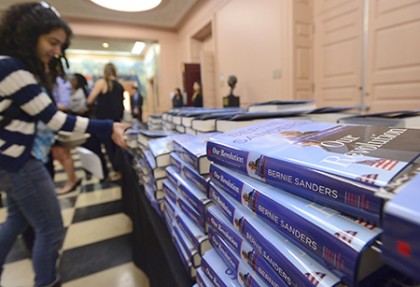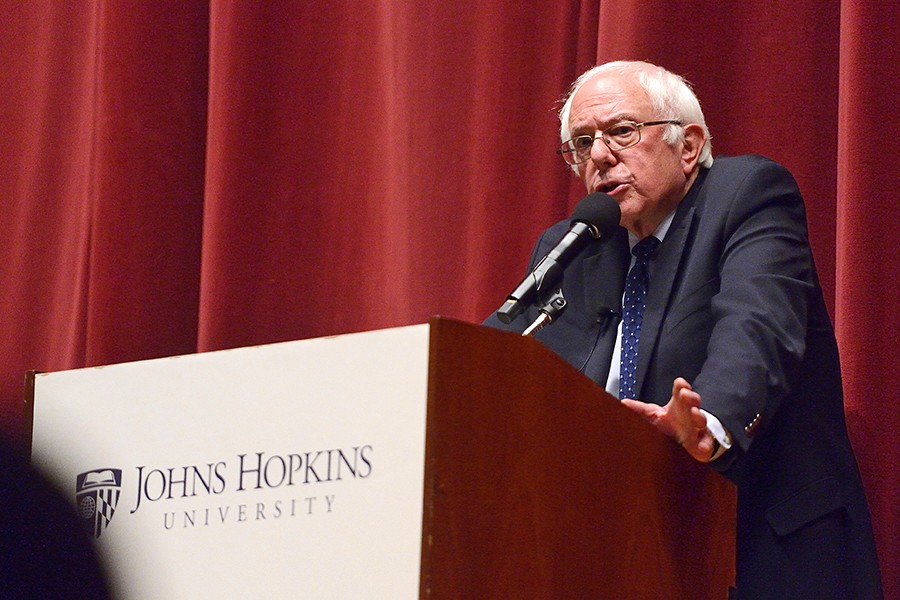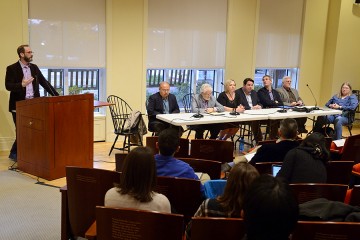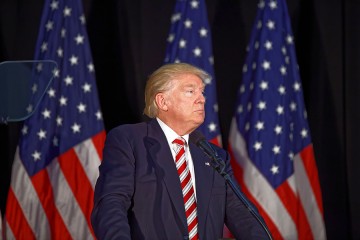Sen. Bernie Sanders, appearing before a capacity crowd at Johns Hopkins University on Thursday night, touted the ideals of his presidential campaign as the basis for a growing political revolution that will continue even after President-elect Donald Trump assumes the nation's highest office.
Nine days after the polarizing outcome of the presidential election, the Vermont independent said he doesn't see the stark divides in America that the media has depicted.
"I reject the idea that we are divided," Sanders said, arguing that "the overwhelming majority" of Americans in fact agree on core economic goals like raising the minimum wage, building infrastructure, creating jobs, and offering affordable public higher education.
"People are coming together around an agenda that calls for economic justice," he said, echoing refrains of his campaign that captured the interest of many progressives and elevated him as a dark horse rival to Hillary Clinton during the Democratic primaries.
Sanders, who campaigned for Clinton after his defeat in the primaries, visited Johns Hopkins a day after Senate Democrats promoted him to a leadership post as outreach chair.
He spoke to an enthusiastic, mostly young crowd at Shriver Hall, in an event arranged and sponsored by two student-run speaker series, the Milton S. Eisenhower Symposium and the Foreign Affairs Symposium. Tickets, which were free, were claimed within minutes after they became available online on Nov. 6. Event organizers arranged for overflow rooms to live-stream the forum for those who weren't able to secure a ticket.
Though Trump's forthcoming presidency didn't dominate Thursday's discussion, Sanders suggested a common theme of economic discontent between Trump's campaign and his own agenda. He painted a dismal picture of the day-to-day financial realities of many working-class Americans.
"That is a reality that the media does not talk about, a reality the Democratic Party does not talk about enough," Sanders said, "but it is a reality which Donald Trump talked about."
He said Trump's supporters are "not bad people," but among the "millions of people [who] are suffering economically."
"They're hurting," he said. "Donald Trump is president in my view not because all of his supporters are racist and terrible people."
But Sanders criticized the president-elect for his views on climate change.

Image caption: All attendees at Thursday's event received a free copy of Bernie Sanders' new book, "Our Revolution: A Future to Believe In."
Image credit: Will Kirk / Johns Hopkins University
"Donald Trump happens to believe that climate change is a hoax," he said, calling that stance "beyond stupid" but halting audience laughter as he pointed to the worldwide ripple effects that could occur if the United States ignores the crisis.
Everyone in attendance received a free copy of Sanders' new book, Our Revolution: A Future to Believe In, which is already an Amazon bestseller. The book looks back on Sanders' political history and his unconventional presidential campaign, which by all accounts started on the fringes but became, as he writes, "one of the most consequential campaigns in the modern history of the country." The book's second half lays out a step-by-step agenda for transforming America, addressing issues like the country's "rigged economy," the decline of the middle class, and criminal justice reform.
Reiterating messages that he often used on the campaign trail, Sanders spoke of the resentment building toward America's political oligarchy and Wall Street greed. "Increasingly … we are becoming a nation in which both the economy and our political lives are dominated by a very small number of extraordinarily wealthy families," he said.
Johns Hopkins University President Ronald J. Daniels, who posed questions submitted by students, asked Sanders for his views on the electoral college system, which has come under renewed scrutiny as results show Clinton leading the popular vote tally by more than 1.3 million.
Sanders criticized the election structure for the way it dictates national campaigns, rendering states like Maryland "totally irrelevant."
Also see
"You've got 50 states in the country, yet all of the money, all of the time, all of the energy, went to 15 or 16 states. Two-thirds of the states were ignored," he said. "So does that make sense? I think not."
To students wondering how they can make an impact post-election, Sanders said, "You want change? No one's going to give it to you," he said, encouraging them to "exercise strength collectively" on their causes. He pointed to progress on the idea of a $15 minimum wage, which many cities have enacted through legislation.
"If one million young people marched on Washington" to demand more affordable higher education, he said, "you will achieve that. Politicians will be looking out the window."
Asked if a 2020 campaign was on the table, Sanders—who noted that his wife Jane, in the audience, didn't want him to run in 2016—dismissed the topic as premature.
"This is what CNN would love," he said, urging people to focus instead on the "enormous issues facing us today and in the coming years."
Posted in Politics+Society
Tagged politics, election 2016, bernie sanders










